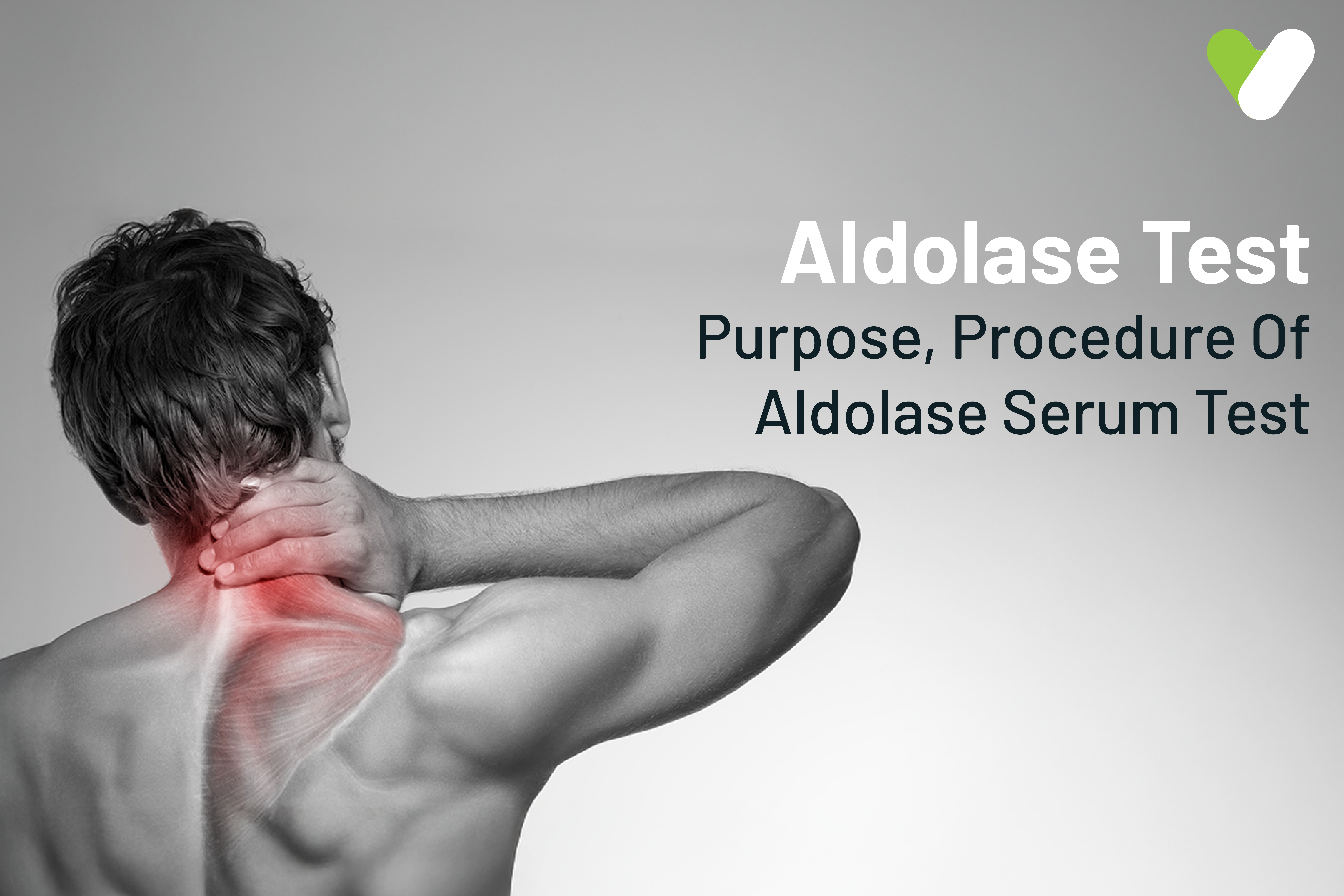What Is Aldolase Test?
An aldolase test is performed to check for muscle disease by measuring the aldolase enzyme in your blood. Your body transforms sugar into energy. But this is an intricate process and aldolase is a prime enzyme that is involved in this process. Though aldolase is present in your entire body, still, high concentrations are found in skeletal muscle and the liver. If there is damage to your liver or muscle, then your aldolase levels in the blood will be elevated.
The cost of an aldolase blood test is Rs.900 to Rs.1200, depending on your location and place. Please check the price of the aldolase blood test in Delhi/NCR, your nearby centers and other details.
Aldolase Test Summary
| Also known as | ALS |
| Test Type | Blood |
| ALT test includes | diagnose and monitor certain conditions that damage the skeletal muscles and organs |
| Preparation | 8-12 hours of fasting is required |
| Reporting | Within 24 hrs |
| Test price | The cost of an aldolase blood test is Rs.900 to Rs.1200, depending on your location and place. |
| Also included in | Health Insurance Plans |
| Related tests | CBC, creatine kinase, alanine aminotransferase (ALT), Aspartate aminotransferase (AST) |
High Aldolase Causes
High levels of aldolase in the blood can indicate muscle or liver damage. Here are some common causes of elevated aldolase levels:- Muscular Dystrophy: Conditions like Duchenne muscular dystrophy and limb-girdle muscular dystrophy cause muscle damage, leading to high aldolase levels2.
- Inflammatory Muscle Diseases: Conditions such as polymyositis and dermatomyositis cause muscle inflammation and damage.
- Liver Diseases: Liver conditions like hepatitis or cirrhosis can also result in elevated aldolase levels.
- Hemolytic Anemia: This condition involves the destruction of red blood cells, which can increase aldolase levels.
Serum Aldolase Test Purpose
The core purpose of this test is to diagnose and monitor various conditions that may damage the skeletal muscles and organs.This test may portray muscle or organ damage that has occurred due to injury or a condition that influences the muscles or organs. Your doctor may recommend this test along with other muscle enzyme tests to diagnose various muscle diseases like muscular dystrophy, polymyositis, and dermatomyositis.
By performing this test, your doctor will understand the cause of certain muscle disorders. Many muscle disorders may start in the nervous system and cause muscle weakness or pain. The aldolase test helps your doctor to know more about whether the source of these muscle problems starts from the nervous system or in the tissues of the muscles themselves.
Sometimes, your doctor may refer to this test for patients who are receiving treatments for muscle diseases. By checking the value of the test, the doctor can understand how a patient is responding to treatment.
Aldolase Serum Test - When is it recommended?
- Aldolase test is primarily used to diagnose myopathy. This is a common muscle disorder.
- If you are having inflammatory muscle disorders like polymyositis and dermatomyositis
- If you are suffering from Rhabdomyolysis (a process in which muscle tissue breakdowns)
- If you are suffering from muscle pain and feebleness due to infectious disease
- If you are taking medications that are responsible for muscle pain
High Aldolase Symptoms
High aldolase levels in the blood can indicate muscle or liver damage. Here are some common symptoms associated with elevated aldolase levels:- Muscle Weakness: Difficulty in performing everyday tasks due to weakened muscles.
- Muscle Pain: Persistent or severe muscle pain, often accompanied by tenderness.
- Fatigue: Unusual tiredness or lack of energy.
- Swelling: Inflammation or swelling in the affected muscles.
- Liver Symptoms: If liver damage is the cause, symptoms may include jaundice (yellowing of the skin and eyes), abdominal pain, and dark urine.
Symptoms associated with myopathy are
- Muscle numbness
- Cramps
- Stiffness
- Spasms
- Muscle pain or myalgia
If you are having symptoms of muscle or liver damage, your doctor may recommend other enzyme tests like ALT test , AST, etc. along with an aldolase test.
Also Read : What, Why, How of Liver Function Test
Aldolase Test - Preparation
Your doctor will tell you how to prepare for the test. You may need to do fasting 6 to 12 hours before the test. This means you can’t eat anything before 8-12 hours of the test.Exercise may influence your aldolase test results. Inform your doctor if you are into a regular exercise program. Your doctor may ask you to restrict your exercise for several days before the test. If you are taking any supplements or over-the-counter medications, your doctor may ask you to stop taking medications temporarily. Medications may hamper the test results.
Aldolase Test - Procedure
A healthcare provider will take a sample of your blood by inserting a needle into your vein on the arm. The person will tie an elastic band to enhance the flow of the blood. Your blood will be deposited into a collection tube.After the test, the needle will be removed and the lab technician will put up a bandage or gauze at the puncture site. After the test, you may resume your normal activities immediately after the test.
Aldolase Test Results
Aldolase normal range is between 1.0 to 7.5 units per liter (U/L) for people 17 years and above. Normal results for people up to 16 years old can reach 14.5 U/L.High or Abnormal Aldolase Levels
Elevated aldolase levels could be due to various health conditions, including- Muscle damage
- Dermatomyositis
- Viral hepatitis
- Liver, pancreas or prostate cancer
- Muscular dystrophy
- Heart attack
- Polymyositis
- Leukemia
Low Aldolase Levels
Less than 2.0 to 3.0 U/L has considered low-levelLow levels of aldolase are responsible for the below-mentioned health conditions
- Fructose intolerance
- Muscle-wasting disease
- Advanced stage of muscular dystrophy


